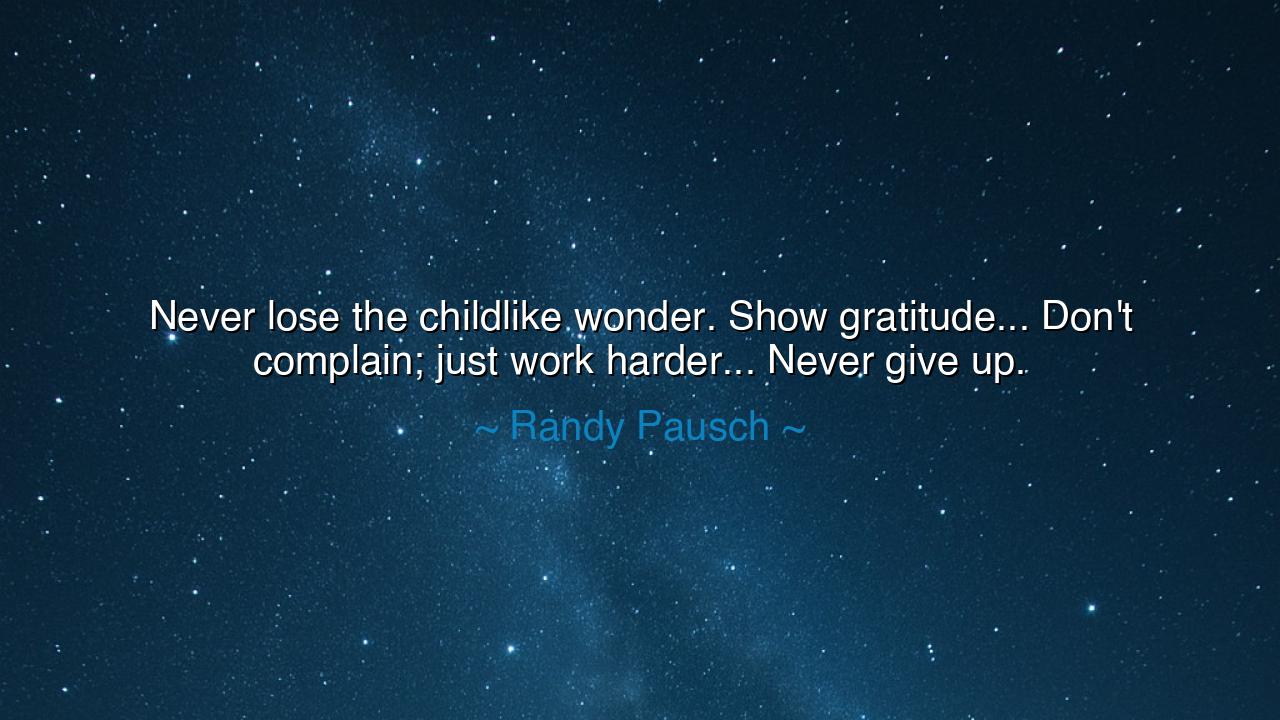
Never lose the childlike wonder. Show gratitude... Don't
Never lose the childlike wonder. Show gratitude... Don't complain; just work harder... Never give up.






When Randy Pausch declares, “Never lose the childlike wonder. Show gratitude... Don’t complain; just work harder... Never give up,” he speaks as one standing at the threshold of eternity, offering his final treasures of wisdom to those who remain. His words shine with the clarity of a man who has measured the worth of life and found its essence in simplicity, humility, and perseverance. To hold onto wonder, to live with gratitude, to labor without complaint, and to endure without surrender — these are the pillars of a meaningful life.
The origin of this saying lies in Pausch’s famous Last Lecture, spoken as he faced the shadow of death with courage and grace. Knowing his time was short, he chose not to dwell in sorrow but to pass on the distilled truths of his journey. Thus his counsel is not abstract philosophy but the voice of lived experience, forged in the fire of mortality. The weight of his words rests in their sincerity: they are not theories, but practices that sustained him through his days.
To preserve the childlike wonder is to keep the soul awake to beauty, curiosity, and joy, even in a world heavy with burdens. To show gratitude is to transform every moment into a gift, softening the heart against bitterness. To refuse to complain is to deny despair its voice, and to work harder is to seize agency in the face of difficulty. Finally, to never give up is to align with the eternal spirit of endurance, which carries mankind through trials beyond measure.
These teachings echo the wisdom of the ancients, who taught that the measure of a life is not in its length but in its depth. Pausch’s words remind us that joy, humility, diligence, and perseverance are the enduring virtues that carve meaning from fleeting time. His voice, though rooted in his own story, resounds as counsel for all ages.
Let future generations remember: life is fragile, yet luminous for those who hold onto wonder and gratitude, who meet hardship with work instead of complaint, and who endure with unwavering spirit. Pausch’s final gift was not sorrow, but hope — a reminder that the art of living is to treasure every breath, to labor with heart, and to rise each day refusing to surrender.






TNtuyet nhi
Randy Pausch’s words are a great motivator, but I feel that gratitude and childlike wonder might be easier said than done, especially in stressful times. How do we cultivate that mindset when life seems overwhelmingly challenging? Is it possible to stay genuinely grateful and full of wonder, or do we need to embrace moments of struggle to truly appreciate the good? It's a tough question that makes me think about how I approach both my struggles and triumphs.
GDGold D.dragon
What stands out to me in Pausch’s quote is the idea of not giving up. But is there a danger in this relentless mindset? Could there be moments when it’s healthier to step back and give ourselves a break rather than pushing forward endlessly? Maybe 'never give up' is more about maintaining determination and focus, but also knowing when to take a breather to prevent burnout.
QHChau Quoc Hau
Pausch’s advice is beautiful, but I wonder—how can we maintain childlike wonder in a world that sometimes feels jaded? It’s easy to lose that sense of awe when facing the harsh realities of life. Is this a call to actively seek out joy and curiosity in everyday things, or is it an ideal that we can only reach in moments of peace? I think it's about choosing to see the beauty in life, even when it’s difficult.
GDGold D.dragon
I love the sentiment in Pausch's quote about gratitude and perseverance. But when life gets tough, is it really possible to just 'work harder' and 'never give up'? Sometimes it feels like pushing through obstacles can be overwhelming. How do we know when to keep fighting and when to take a step back and reevaluate? There’s a balance between persistence and knowing when it's time to pivot.
QTLang quang tien
Pausch’s words seem like a reminder to keep things in perspective, but I can’t help but think: is it always realistic to never complain? Sometimes, it feels like complaining is a natural outlet for frustration. How do we channel that energy into working harder without burning out? It’s easy to say ‘don’t complain,’ but isn’t it also important to acknowledge and process difficult emotions rather than just power through?